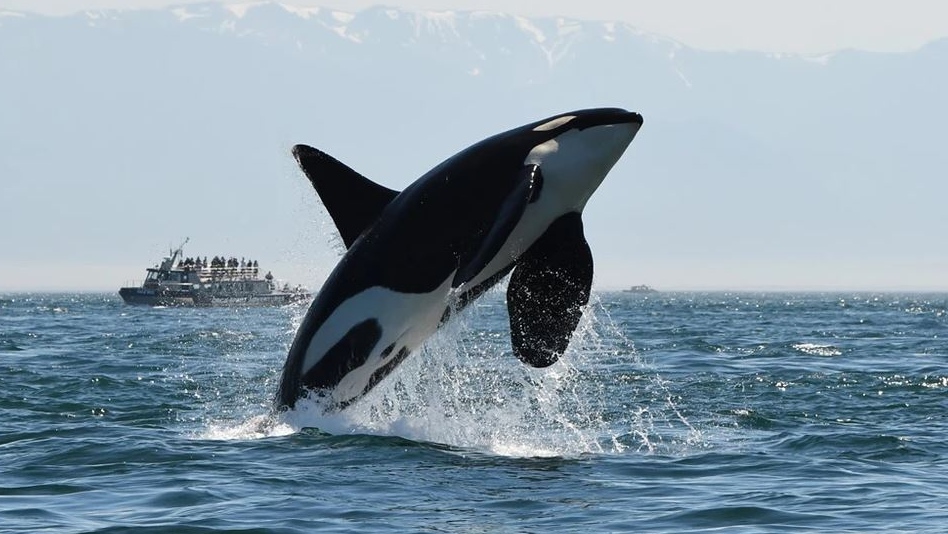Endangered orcas suffered calorie deficit in recent years: UBC study
 Southern resident orca K25 is seen in mid-breach. Researchers now fear the killer whale is one of three endangered southern residents that have died. (Dave Ellifrit/Center for Whale Research)
Southern resident orca K25 is seen in mid-breach. Researchers now fear the killer whale is one of three endangered southern residents that have died. (Dave Ellifrit/Center for Whale Research)
A new study released by the University of British Columbia found that southern resident killer whales (SRKW) did not have enough to eat in recent years, which correlates to higher mortality and lower fertility rates.
The study tracked the critically endangered SRKWs over the past 40 years, and found that they did not get enough to eat in six of those 40 years – three of which occurred in the most recent years of the study, from 2018 to 2020.
On average, adult killer whales were about 28,716 calories short in their diet in the six years that deficits were recorded, or about 17 per cent of their average daily energy requirements, according to the study.
"With the southern resident population at such a low level, there’s a sense of urgency to this kind of research," said lead author Fanny Couture, a doctoral student at the Institute for the Oceans and Fisheries (IOF) and Ocean Wise, in a release Monday.
As of October 2021, the SRKW population numbered about 73 orcas.
CHINOOK SALMON DECLINES
The southern residents feed mostly on Chinook salmon, and when Chinook salmon populations declined, the orcas were affected, the study found.
"The years where southern residents were in an energy deficit are also years where other studies report lower population growth rate and higher mortality rates for the killer whales," said Dr. Villy Christensen, professor at IOF and co-author of the study.
Researchers are uncertain why Chinook salmon populations are declining, though there are several factors, including climate change, disease, and predation by other animals.
Commercial fishing also plays a role, though researchers say Chinook salmon harvesting was reduced in Canada in the late 1990s, and that salmon declines have continued over the past two decades.
"Those declines have continued despite severe fisheries reductions, and one very likely candidate for causing them is the massive increase in abundance of Steller sea lions since the mid-1980s; those sea lions now consume more fish than all the B.C. commercial fisheries for all species, combined," said Dr. Carl Walters, senior author of the study and retired professor at IOF.
MORE FISHING RESTRICTIONS MAY BE NEEDED
Researchers found that when Chinook salmon populations were particularly low, southern resident killer whales would feed on other types of salmon, such as chum. However, their energy deficits would still occur.
Study co-authors say more restrictions on Chinook salmon fishing may still be required to protect both the fish and the orcas, as well as further research into underwater noise pollution.
"Both killer whales and Chinook salmon, the southern resident’s main prey, are important, iconic species for the west coast of Canada," said Couture
"Studying what is happening to the population may help offer solutions, both for the southern residents and potentially other killer whale populations in the future."
CTVNews.ca Top Stories

BREAKING Honda to get up to $5B in govt help for EV battery, assembly plants
Honda is set to build an electric vehicle battery plant next to its Alliston, Ont., assembly plant, which it is retooling to produce fully electric vehicles, all part of a $15-billion project that is expected to include up to $5 billion in public money.
BREAKING New York appeals court overturns Harvey Weinstein's 2020 rape conviction from landmark #MeToo trial
New York’s highest court on Thursday overturned Harvey Weinstein’s 2020 rape conviction, finding the judge at the landmark #MeToo trial prejudiced the ex-movie mogul with improper rulings, including a decision to let women testify about allegations that weren’t part of the case.
Residents of northern Alberta First Nation told to shelter in place
Residents of John D'Or Prairie, a community on the Little Red River Cree Nation in northern Alberta, were told to take shelter Thursday morning during a police operation.
Monthly earnings rise, payroll employment falls: jobs report
The number of vacant jobs in Canada increased in February, while monthly payroll employment decreased in food services, manufacturing, and retail trade, among other sectors.
Doctors say capital gains tax changes will jeopardize their retirement. Is that true?
The Canadian Medical Association asserts the Liberals' proposed changes to capital gains taxation will put doctors' retirement savings in jeopardy, but some financial experts insist incorporated professionals are not as doomed as they say they are.
Secret $70M Lotto Max winners break their silence
During a special winner celebration near their hometown, Doug and Enid shared the story of how they discovered they were holding a Lotto Max ticket worth $70 million and how they kept this huge secret for so long.
Remains from a mother-daughter cold case were found nearly 24 years later, after a deathbed confession from the suspect
A West Virginia father is getting some sense of closure after authorities found the remains of his young daughter and her mother following a deathbed confession from the man believed to have fatally shot them nearly two decades ago.
Something in the water? Canadian family latest to spot elusive 'Loch Ness Monster'
For centuries, people have wondered what, if anything, might be lurking beneath the surface of Loch Ness in Scotland. When Canadian couple Parry Malm and Shannon Wiseman visited the Scottish highlands earlier this month with their two children, they didn’t expect to become part of the mystery.
Metro Vancouver mayors call for serial killer Robert Pickton to be denied parole
A dozen mayors from around Metro Vancouver say federal Attorney General and Justice Minister Arif Virani should deny parole for notorious B.C. serial killer Robert Pickton, and reassess the parole and sentencing system for 'prolific offenders and mass murderers.'






























